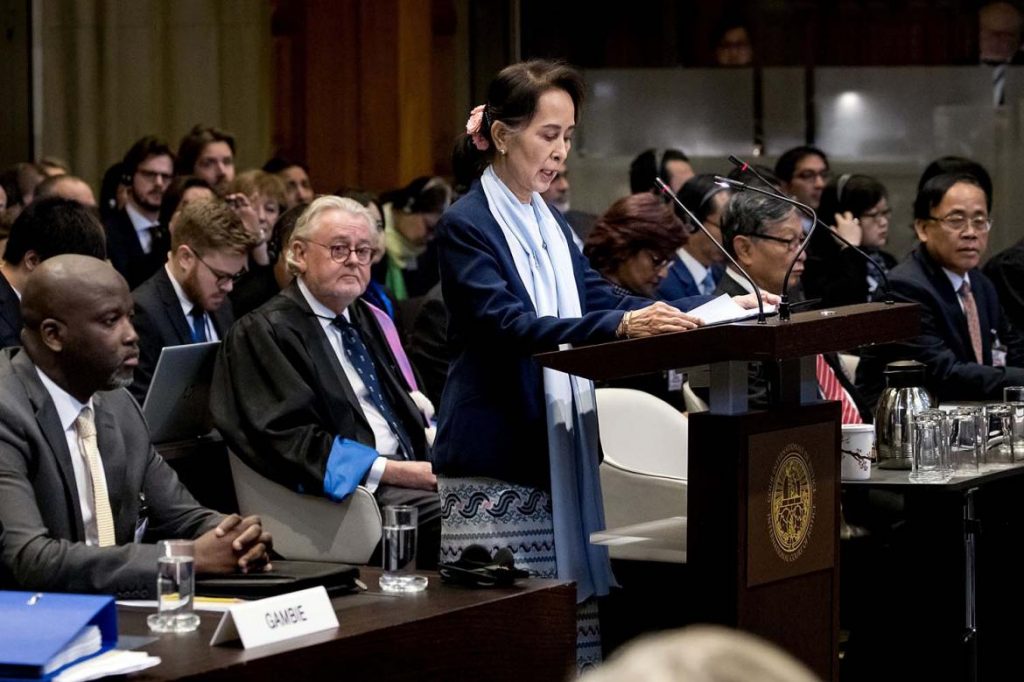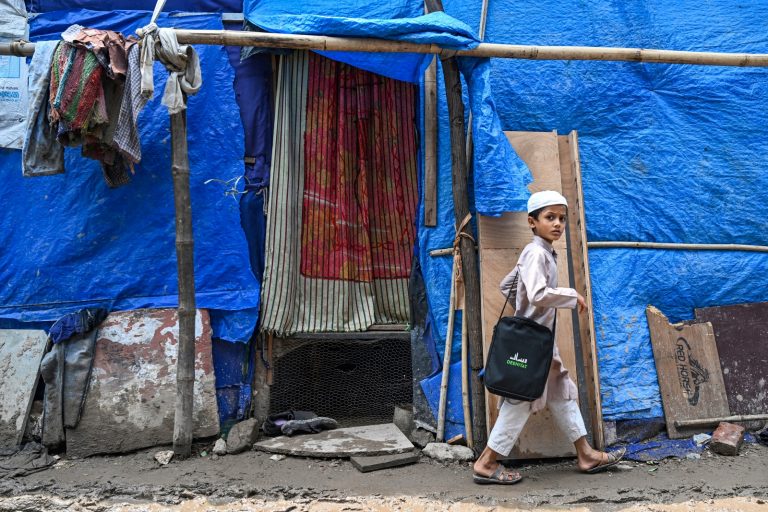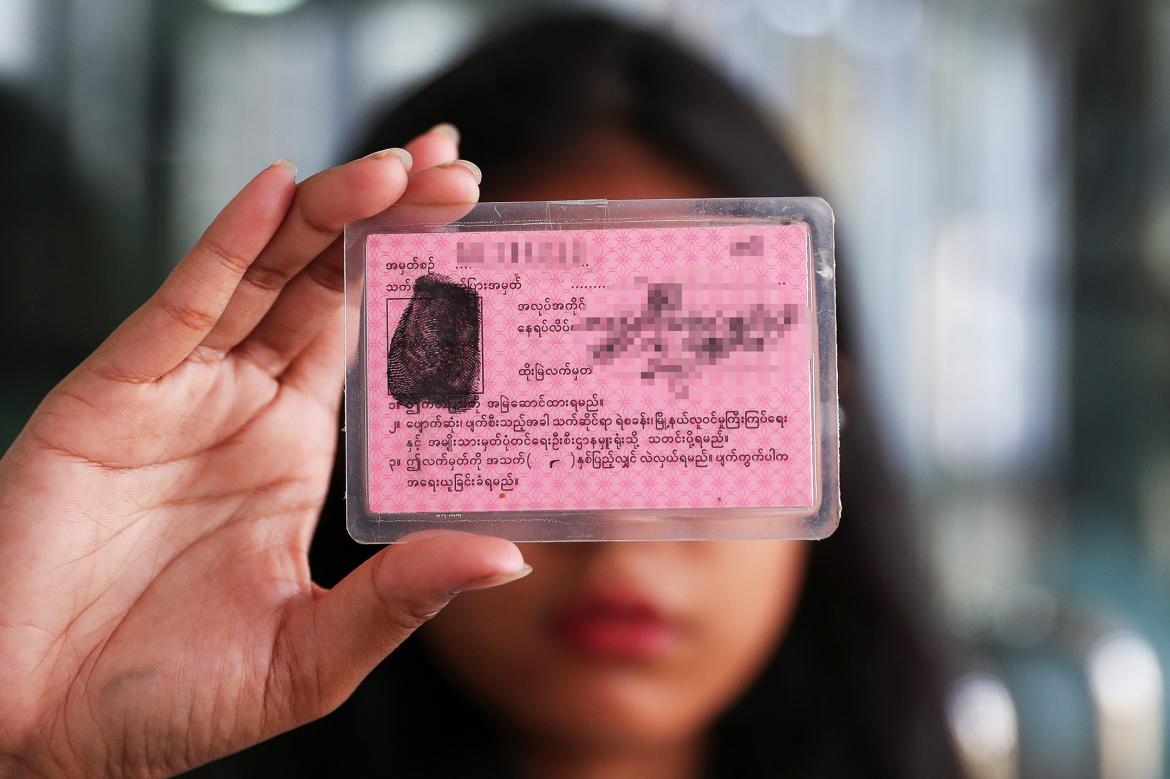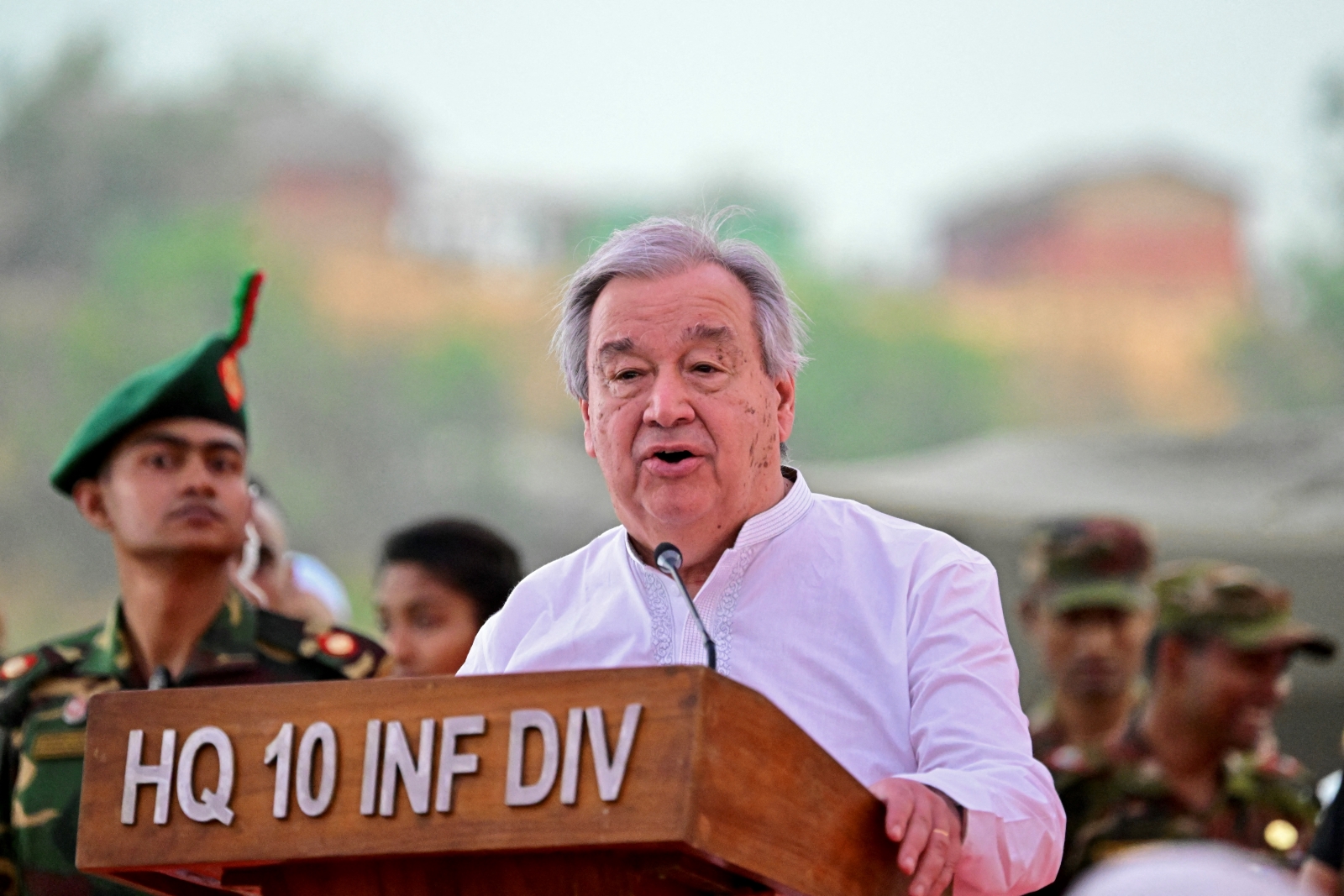By ANDREW NACHEMSON & LUN MIN MANG | FRONTIER
YANGON — A staff member at the Independent Commission of Enquiry served simultaneously on the legal team that defended Myanmar against genocide allegations at the International Court of Justice, Frontier has learned, in a development that raises concerns over conflict of interest.
Ms Leena Ghosh served as a staff member on the ICOE, a government-appointed panel tasked with investigating allegations of abuses in Rakhine State, which released its long-awaited report last week, and has been accused of whitewashing the military’s alleged crimes against the Rohingya..
Ghosh was also an advisor to Myanmar’s Joint Peace Fund until December 31. She became a senior peace advisor at the National Peace and Reconciliation Center, a government body assisting with Myanmar’s peace process that receives funding from the JPF, in July 2017, according to her LinkedIn profile.
In a statement, the JPF told Frontier that Ghosh was contracted as a “consultant” to support the peace process. The JPF has 12 donors – including Australia, the United States, Japan, and the European Union.
Support more independent journalism like this. Sign up to be a Frontier member.
Ghosh was then appointed head of the ICOE Secretariat, which was established in July 2018 to investigate human rights abuses in Rakhine State, following attacks by the Arakan Rohingya Salvation Army and the military’s subsequent crackdown on the Rohingya, which some observers have labeled genocide.
It’s unclear when Ghosh joined the ICOE, but the JPF did not learn until August 2019 that she was heading the Secretariat, said a source familiar with the matter.
In December last year, The Gambia accused Myanmar of genocide at the ICJ, and Ghosh was appointed as an advisor on the defence team.
Rights observers and legal experts told Frontier that taking on roles in both the body set up to investigate rights abuses, and the team denying those abuses at the world court, showed a clear conflict of interest which casts further doubt on the ICOE’s independence.
At the same time, donors felt Ghosh’s work in the ICOE was a violation of her contract with the JPF, and made worse by the fact that she had failed to inform the JPF, a source familiar with the matter told Frontier.
“People were pretty unhappy with the fact that she was doing this work without making the JPF and donors aware,” he said.
Her contract with the JPF expired on December 31 last year and was not renewed. While the source said that the contract was not renewed because of Ghosh’s work on the ICOE, a JPF spokesperson told Frontier that the issue never arose because she decided to return to Malaysia at the end of the year.
The ICOE has already been subjected to scathing criticism, both before and after it submitted its report earlier this month, for a perceived lack of independence from the government.
An executive summary of its report showed that the ICOE found no evidence of genocide and no evidence of sexual violence, despite widespread reports of rape, leading many to dismiss it as a whitewash.
It would be a potential blemish for the JPF if funds meant for the peace process were used by Ghosh in her capacity at the ICOE.
“It was made clear that no JPF funding or technical assistance could be used for any ICOE, ICJ, or other non-peace process related work,” JPF told Frontier. It is not known for how long Ghosh had been working for the ICOE without the JPF’s knowledge.
Photographs published by the ICOE and government ministries show Ghosh accompanying the team during field visits to Rakhine, speaking with ICOE chairperson Ms Rosario Manalo and meeting local government officials.
A document from the Rakhine State government shows that she visited with Manalo and the rest of the team in August 2018. During that visit they travelled by convoy, with Ghosh in the same car as ICOE investigators Dr Aung Tun Thet and U Mya Thein. Another document instructed translators who hoped to work for the ICOE to send their applications to Ghosh.
Bangladeshi media identified Ghosh as head of the ICOE Secretariat when she visited with an ICOE “advance team” in August 2019, before joining Myanmar’s legal team at the ICJ. Her role in the Secretariat was confirmed to Frontier by Aung Tun Thet.
Ghosh is a Malaysian national with an MA in human rights from the University of Essex in England, according to her LinkedIn page. Her relationship with Manalo goes back many years. They were both part of the ASEAN Intergovernmental Commission on Human Rights from at least 2010 to 2015, with Ghosh serving in the Secretariat while Manalo was the Philippines representative.
Mr Phil Robertson, deputy director of Human Rights Watch’s Asia division, said Ghosh’s positions at the ICOE and ICJ constituted “yet another blatant conflict of interest” that damages the ICOE’s credibility.
“The word ‘independent’ never really belonged in the title of the ICOE, since from the get-go this was a Myanmar government effort to divert attention from truly impartial investigations and accountability,” Robertson told Frontier via email.
A previous controversy centred around Aung Tun Thet, who is also the chief coordinator for the Union Enterprise for Humanitarian Assistance Resettlement and Development (UEHRD). The UEHRD is headed by State Counsellor Daw Aung San Suu Kyi and was accused by the UN Fact Finding Mission of consolidating the “consequences of war crimes” by taking land abandoned by fleeing Rohingya.
Aung San Suu Kyi is also the head of the NRPC, meaning the state counsellor is the direct superior of both Ghosh and Aung Tun Thet in their other roles. The NRPC also shares an address with the ICOE, according to its website.
It was Ghosh’s presence on the defence team that was most concerning for Robertson and Mr Sam Zarifi, secretary-general of the International Commission of Jurists, an international organisation that focuses on promoting human rights through rule of law and legal expertise.
Aung Tun Thet defended the independence of the ICOE, saying Ghosh was just acting at the ICOE’s instructions. “I think we can ask anybody to help us with the ICOE’s tasks,” he said in an interview, adding that Ghosh’s role at the ICJ is “her own matter”.
Responding to an inquiry from Frontier, Ghosh did not directly address whether her dual role affected the integrity of the ICOE, and did not specifically elaborate on her duties at the ICOE. She pointed to the ICOE Terms of Reference, which state that the Myanmar government will provide the ICOE with secretariat services.
“These include all financial, administrative, technical and logistical assistance required to enable the ICOE to fulfil its mandate promptly and efficiently,” she said in the email, adding that the ICOE would be provided with legal counsel and research staff if required.
“For your information, National Human Rights Commission are funded by Governments,” she added. Ghosh did not respond to a follow up email about her contract with the JPF.
During an interview in Yangon, Zarifi agreed that it is normal for independent inquiries to be funded by governments but said the ICOE’s problems run deeper than funding. He said on its face, the ICOE does not meet international standards of independence or impartiality, and its competency is unknown, as details of its methodology have not been released.
Zarifi, who said he knows Ghosh personally, called her role at the ICJ “problematic” and said it “certainly calls into question the independence and impartiality of the ICOE”. He did defend her credentials, however, saying Ghosh is a “prominent ASEAN human rights person”.
“I wouldn’t dismiss her good intentions,” he said. “But it creates a further impression of the ICOE being intertwined with the government.”
Zarifi said government-appointed inquiries like the ICOE have these kinds of problems “all the time”.
Robertson said the government should have put a “firewall between the ICOE and all agencies of the government,” and Ghosh should have been “nowhere near” the ICJ defence team.
“Ultimately, Leena Ghosh’s conflict of interest is the icing on the cake of a failed Myanmar attempt to outwit the systems of international justice, and those efforts were too little, too late,” he said.
Correction, January 31: This article has been amended to remove a statement that Ms Ghosh’s JPF contract was not renewed because of her work on the ICOE, and updated to include a statement on the matter from JPF.
Letter to the editor, January 30:
Dear Editor,
I wish to refer to the article attributed to Andrew Nachemson and Lun Min Mang which appeared on the Frontier Myanmar website on January 29, 2020. The article is not only unfair but also contains allegations that are untrue.
Ms Leena Ghosh was contracted by the Joint Peace Fund (JPF) as part of the assistance provided to the National Reconciliation and Peace Centre (NRPC). Under her contract, she reports directly to the Vice Chairman (1) of the NRPC. Her terms of reference (ToR), among others, include “any other tasks assigned by the Vice Chairman (1) of the NRPC”.
The Independent Commission of Enquiry (ICOE) was set up to investigate allegations of human rights violations and related issues following the terrorist attacks by Arakan Rohingya Salvation Army (ARSA) with a view to seeking accountability and formulating recommendations on steps to be taken to ensure peace and stability in Rakhine State. The terms of reference of ICOE specifically mention “as part of its national initiative to address reconciliation, peace, stability and development in Rakhine”.
Reconciliation through accountability is one of the priorities of NRPC. Because of her wide experience, the Vice Chairman (1) of NRPC assigned her to assist the ICOE Secretariat. Ms Ghosh has an LLM in Commercial Law from Exeter University, M.A. in Human Rights from University of Essex, LLB from the University of Leeds, all from United Kingdom and she was called to the bar in the UK, Singapore and Malaysia. Because of her desire to promote and protect human rights, Ms Ghosh left her lucrative legal career to work in the field of human rights.
Ms Ghosh was assigned to help the ICOE by the Vice Chairman (1) of NRPC. Upon JPF raising the issue, the Vice Chairman (1) of NRPC wrote to the Chair of JPF that she was assisting the ICOE as assigned by him as stipulated in her ToR. She applied for and was granted leave by JPF for the trip to accompany the Myanmar Delegation to The Hague, in her capacity as advisor to Alternate Agent, the Vice Chairman (1) of NRPC.
The article was inaccurate, untrue and unfair when it mentioned, “As a result, her contract with JPF was not renewed after it expired on December 31 last year.” In truth, her original contract ended on July 14, 2019, and Ms Ghosh wanted to return to Malaysia to attend to personal matters. However, she agreed to extend her contract further until December 31, 2019, to which JPF agreed. She had no intention nor did she ask for any further extension and left JPF at the end of her contract.
As Director General in charge of Peace and Reconciliation issues, I had worked with Ms Ghosh extensively. The authors of the article, perhaps in their zeal to discredit ICOE, have done a great wrong to Ms Ghosh, a dedicated and – as the article mentioned – “prominent ASEAN human rights person”.
Zaw Htay
Director General
Ministry of the Office of the State Counsellor
Editor’s note, January 31:
Frontier Myanmar welcomes this response from the government, and has corrected the article accordingly. The focus of the article was not Ms Ghosh’s credentials or the quality of her work, but whether assigning an individual to roles on both the ICOE and the defence team at the International Court of Justice undermined the independence and credibility of the ICOE. Ms Ghosh was also given ample time to respond to all of the points raised in the article.







